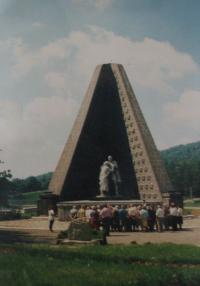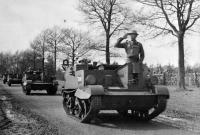Anna Repaská
* 1923 †︎ 2017
-
“I remember when for example the casualties kept on coming for two months without a break – an ambulance after ambulance. We were tired, exhausted and I took a newspaper. So I read and look what is new and then I see – theatre and cinema programs. It seemed unbelievable, how can anyone go to a theatre in these hard times when we live here, literally, in hell, with so many people dying and moaning. One can’t imagine a life that is different from the one he or she is living.”
-
“When there were no fights, when there was peace. I mean, the armies do not attack each other all the time, there are periods of defense, ‘peace’. We set up a beauty contest with the girls or things like that. The life was normal.” [Interviewer:] “And what does a beauty contest at the front line look like?” “A girl that has courage enough goes up on the stage and the men decide which one of the girls is the most beautiful one. They were all in their twenties so they were all beautiful.” [Interviewer:] “Did you have any special disciplines?” “No, no… They were judging their legs and their faces and that was all. All the girls were dressed alike. I would like to stress that the girls, even in the harsh conditions, cared about their looks. We had one charcoal smoothing iron and it was busy all the time. Anytime they could, the girls washed and ironed their clothes to look pretty.” [Interviewer:] “Did have any other entertainment apart from beauty contests? Maybe you could tell the story with pajamas…” “We were about thirty girls. And a supply of pajamas came and there were less pajamas than the girls. So the head officer said: ‘We will gather all the girls and the ones with nice breasts will get the bottoms and the girls with nice legs will get the tops.’ It didn’t happen but these jokes were common.”
-
“All the clinical records had to be written in Russian. And I was fluent in Russian so I wrote them because the doctors didn’t do that, they only dictated them – and I was moving from one doctor to the other and wrote the records. These records were then traveling with the casualties to Russian hospitals. So I saw all the different injuries… head injuries, lung injuries or injuries of the bowels. But for me, the worst were the amputations. When I heard the sound as they were sawing the bone off… Once I also passed off when I saw that! But you came so used to it after a while that you could eat your lunch with bloody hands. First, it becomes a routine and then the sanitary conditions were not quite… Sometimes we had no water to wash our hands in. But we had field baths next to our hospital, so all the casualties were washed before they came to us. So we had sanitary conditions of a kind but it often happened that we went to eat our lunch with bloody hands.”
-
“We were in a foreign territory the whole war. First it was Russia, then Poland, Ukraine and Slovakia. When we crossed the border to Moravia, there were more of us nurses in the van. And some Moravians came – men – and they asked from where we were from and so on. And they all spoke Czech, and we started crying. We were so moved by meeting the first natives and to be in Bohemia… it was an experience I will never forget.”
-
“I was born, which year was that… 1923, I will be eighty this year. My maid name is Martínková and now it is Repaská when I’m married. I was into a Czech family in Volhynia, Ukraine. I went to a Czech basic school. Only the basic school was Czech, then I studied at a pedagogical grammar school in Zhytomyr. I was very good at math and out of the four classes in my grade I was the best, so I considered myself the best pupil at the school. And when they announced the math results, they said: ‘And she is Czech.’ And I was proud to be Czech.”
-
Celé nahrávky
-
ČR, 15.01.2003
(audio)
délka: 01:07:07
Celé nahrávky jsou k dispozici pouze pro přihlášené uživatele.
Nobody can imagine what would German have done if they had won
Anna Repaská was born in 1923 into a Czech family in Volhynia. Even though her childhood wasn‘t easy (her father died when she was 10), she finished a pedagogical grammar school. The situation at Volhynia changed drastically under the German occupation. Anna Repaská witnessed the genocide of the Jewish population. As many Czechs in Volhynia she entered the Svoboda‘s army, where she helped as a nurse. With the Czech forces, she went through the horrors at the Dukla mountain pass and during the subsequent liberation of Czechoslovakia. After the war Anna Repaská moved to the Czech republic stayed in the army and worked as a nurse and later as a financial and accommodation officer. She was married and had a son. Anna Repaská passed away on May, the 6th, 2017.

